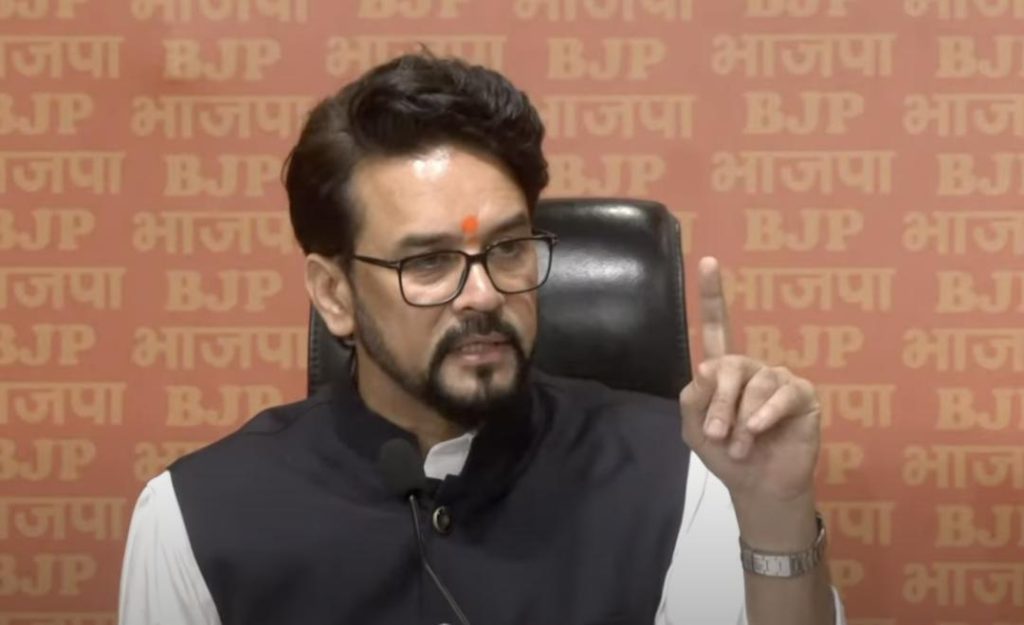
Title: Congress & CPI made Bhimrao Ambedkar lose the poll in 1952: BJP
The Indian elections have been a tumultuous affair, marked by complexities, controversies, and power struggles. One such instance that has recently resurfaced is the 1952 parliamentary elections, where the Congress and Communist Party of India (CPI) allegedly conspired against Dr. Bhimrao Ambedkar, the architect of the Indian Constitution. The BJP has now revived this controversy, claiming that the Congress and CPI’s combined efforts led to Ambedkar’s defeat in the polls.
BJP MP Anurag Thakur recently made these allegations during a speech in the Lok Sabha, stating that the Congress laid the foundation of electoral corruption in the very first election of 1952. He claimed that the Congress and CPI together defeated Dr. Bhimrao Ambedkar, a constitution maker and a saint-like leader, in the election. Furthermore, Thakur pointed out that a staggering 74,333 votes were rejected in the election, raising questions about the legitimacy of the results.
Thakur’s remarks have sparked a heated debate, with many questioning the motives behind the BJP’s sudden interest in this decades-old controversy. However, it is essential to delve into the context and facts surrounding Ambedkar’s defeat in the 1952 elections to understand the implications of Thakur’s statement.
Dr. Bhimrao Ambedkar, a towering figure in Indian history, was a leading figure in the Indian independence movement and played a crucial role in drafting the Indian Constitution. He was also a champion of Dalit rights and a powerful advocate for social justice. In 1952, Ambedkar decided to contest the parliamentary elections from the Bombay South constituency, which was a predominantly Dalit-dominated area.
However, Ambedkar’s decision to enter politics was met with resistance from the Congress and CPI, which saw him as a threat to their power and influence. The Congress, in particular, was wary of Ambedkar’s growing popularity among the Dalits and his potential to mobilize them against the party. The CPI, on the other hand, had its own reasons for opposing Ambedkar, as they saw him as a symbol of the “bourgeoisie” and a representative of the “upper castes.”
The 1952 elections were marked by widespread violence, booth capturing, and rigging, with both the Congress and CPI using underhanded tactics to ensure their victory. Ambedkar’s campaign was marred by protests, intimidation, and even violence, with his supporters being targeted by both parties. In the end, Ambedkar lost the election by a narrow margin, with the Congress candidate, Yashwantrao Chavan, winning by a mere 1,000 votes.
Thakur’s allegations that the Congress and CPI conspired against Ambedkar are not entirely unfounded. There is evidence to suggest that the two parties used all means possible to ensure Ambedkar’s defeat, including rigging the electoral process and using violence to intimidate his supporters. The 74,333 rejected votes, which Thakur mentioned, are a testament to the widespread irregularities that plagued the election.
However, it is essential to note that the BJP’s motives behind reviving this controversy are not entirely altruistic. The party is known for its efforts to appropriate Ambedkar’s legacy for its own political gain, and Thakur’s statement can be seen as a calculated move to polarize voters along communal lines. The BJP has a history of using Ambedkar’s name and legacy to woo Dalit voters, who are a significant electoral force in many parts of the country.
In conclusion, while Thakur’s allegations against the Congress and CPI are not entirely baseless, they must be viewed in the context of the BJP’s political agenda. The party’s efforts to appropriate Ambedkar’s legacy and use it to further its own interests are a disservice to the legacy of a man who fought tirelessly for social justice and equality.
It is essential for political parties to refrain from using Ambedkar’s name and legacy for political gain, and instead, focus on addressing the systemic issues that continue to plague Indian society. By doing so, we can ensure that Ambedkar’s vision of a more equal and just society is realized, and his legacy is not reduced to mere political rhetoric.
News Source: https://youtu.be/0kLyW5rSJSg






